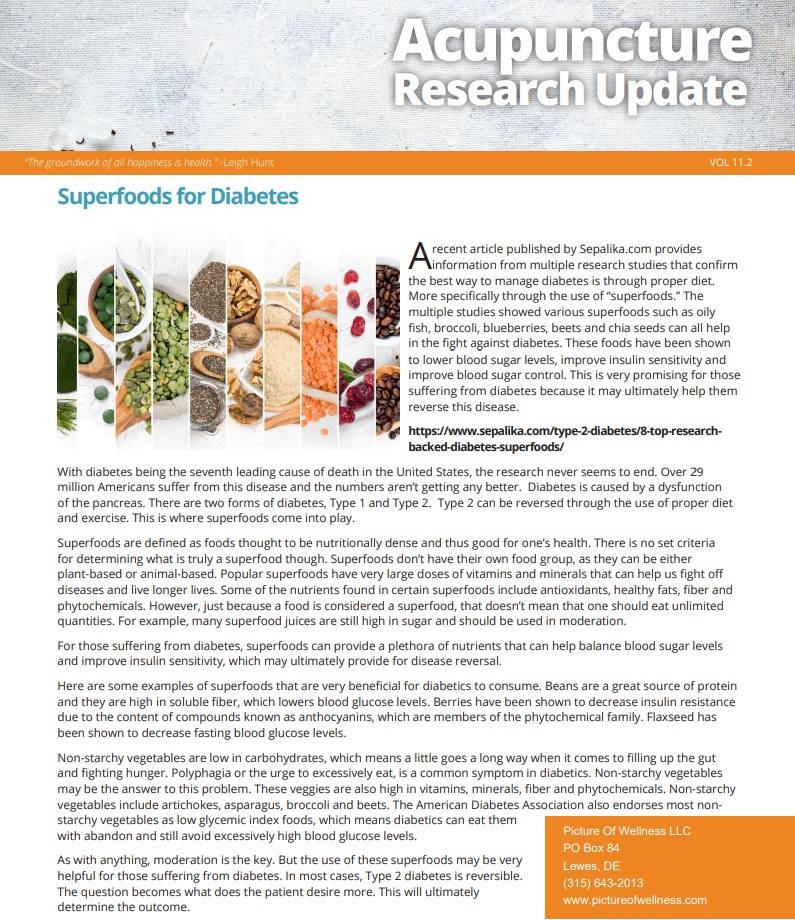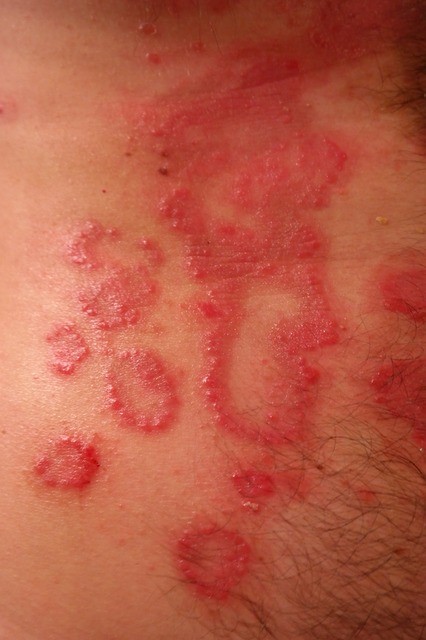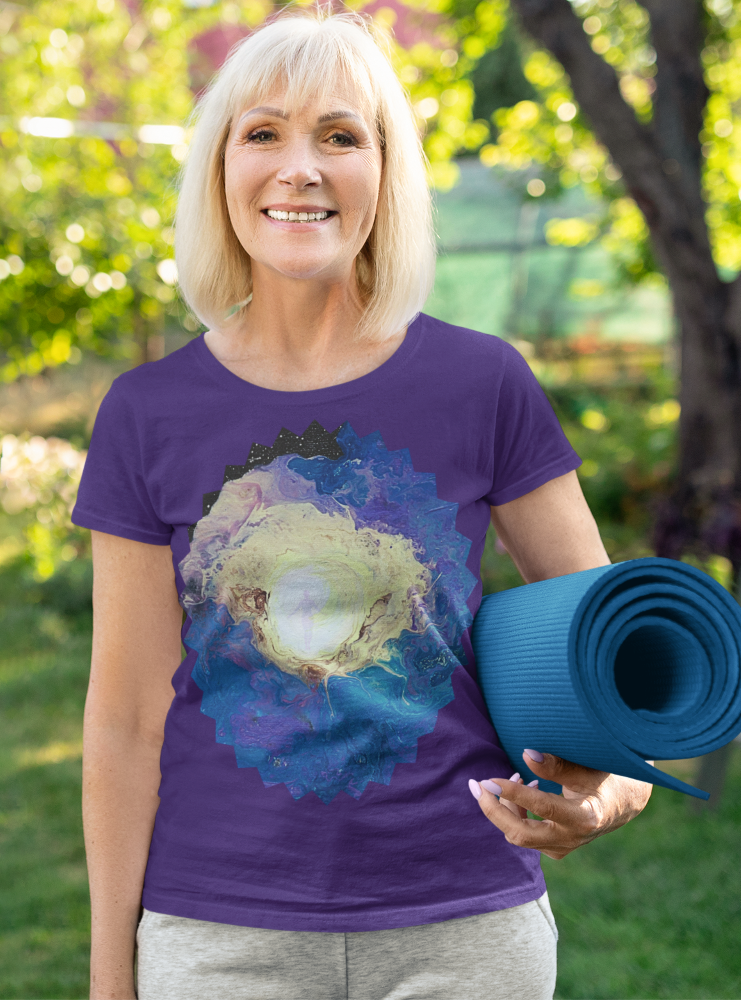Superfoods For Diabetes

 More than 7.5 million Americans have
More than 7.5 million Americans have
psoriasis, an autoimmune disorder
that can be frustrating and painful. A
study from UCLA found that acupuncture
cleared psoriasis flares in half the people
in the study and improved symptoms in
an additional 25 percent of patients. Jamie
Starkey, LAc, is the lead acupuncturist
at the Center for Integrative Medicine at
the Cleveland Clinic’s Wellness Institute
and says that because psoriasis is an
autoimmune disease, acupuncture is a safe
alternative that can help psoriasis as well as
other autoimmune disorders. Acupuncture
is unlikely to interfere with other psoriasis
treatments and can be added to a treatment plan. If you or someone you know is
suffering with psoriasis, contact an acupuncturist for effective, alternative treatment!
5 Alternative Treatments and Home Remedies for Psoriasis
For people with psoriasis, suffering from painful symptoms like inflamed, flaking and red skin is not pleasant. The chronic skin condition is due to an overactive immune system that can be triggered by a number of internal and external factors. Many Western treatments include steroid creams and oral medications that come with a slew of unwanted side effects.
Below are alternative treatments that are safe and natural and can help reduce symptoms of psoriasis, leading you back to better health.
1. Herbal Remedies
● Aloe Vera: The gel from this cactus plant can be used generously on your skin to reduce redness and scaling caused by psoriasis. Aloe vera can be found in almost any grocery or health store.
● Tea Tree Oil: Tea tree oil is thought to have antiseptic properties. It can sooth irritated skin or scalp and can be applied daily.
● Turmeric: Turmeric has strong anti-inflammatory and antioxidant properties. Because of this, turmeric has been found to reduce psoriasis and psoriatic arthritis flares. Turmeric can be found in pill form as well as powder form to be added to food.
● Dead Sea Salts: Soaking in a bath with Dead Sea salts or Epsom salts can remove scaly skin and reduce itching. It is recommended that you use warm water and stay in the tub for 15 minutes.
2. Mindfulness/Meditation
Mindfulness and meditation practices have been found to be effective in people suffering with chronic pain like psoriasis.
Meditation is the practice of focusing your attention on the moment and ridding yourself of all external thoughts you may be having. This can lead to a state of relaxation and calmness, bringing balance to your body and mind.
Mindfulness, which is practiced in meditation, includes becoming completely aware of your body, externally and internally. This can be a seated meditation that is focused on awareness of mind, body and senses.
3. Exercise
Not only is exercise important to maintain overall health and wellness, it is especially beneficial for people with psoriasis.
Because people with psoriasis have an increased risk of heart disease and type 2 diabetes, regular exercise can prove very helpful.
Many find it hard to exercise because of the chronic pain associated with psoriasis. Exercise programs in the water prove to be an effective alternative that is easier on the body and still allows you to build endurance and strength.
Other simple ways to fit more exercise into your day include short walks, taking the stairs and stretching.
4. Massage
Seeing a licensed massage therapist can help reduce symptoms and pain. Massage promotes the function of muscle and connective tissue and can increase relaxation and circulation in the body.
5. Acupuncture
Acupuncture has been proven to be effective in minimizing chronic pain in patients. Acupuncture takes a holistic approach with the body and symptoms you may be experiencing. By returning the body to its natural flow, acupuncture can help reduce the intensity of symptoms of psoriasis.
Home Remedies:
● Soak a towel in cold milk and apply to affected area to relieve itching.
● Add ½ cup ground oatmeal into a warm bath.
● Rub the affected area with the inner side of a banana peel.
● Apply aloe vera gel to affected area.
● Cut several fresh willow branches into 3-inch stems and place in a pot with plenty of water. Bring to a boil, then simmer until water becomes black. Wash affected areas with the water three times daily.
● Slice 15 water chestnuts and soak in 3 oz. of rice vinegar crush and store in a sealed jar. Apply the paste to affected area and cover with gauze. Change daily.
Sources: https://www.psoriasis.org/about-psoriasis

Welcome to my world of whimsical custom art, where everyday items like t-shirts, journals, candles, tote bags, pillows and more are transformed into delightful works that spark joy and inspiration. Each creation is infused with playful designs, vibrant colors, and heartwarming messages, turning ordinary objects into unique expressions of creativity and emotion. My art is a reflection of my personal touch, resonating with the spirit of love, joy, humor, and whimsy. Drawing inspiration from the beauty of nature, enchanting animals, blooming flower gardens, my beloved pets, and the mystical realm of metaphysics, I pour my heart and soul into every piece. I hope my creations bring a touch of magic into your life and brighten your days with laughter and love.

This blanket is made from a painting I made while feeling inspired by my flower garden. The saying 'Bloom where you are planted' inspires me to remember to be grateful for all that I have.

Environmental conservation is dear to my heart...it should be with the devotion it took to be granted a Bachelor's degree in Environmental Science. The insects on our planet are suffering from the enormous amounts of pesticides. I took this picture of a firefly on my flowers at night. How many people know what a firefly looks like or that their numbers are drastically dwindling? I hope this collection inspires conversations and positive changes.

This lovely lady is wearing one of my paintings that I call 'into the light.' It was born from my fascination with all things celestial.

'Metaphysicat'...It is a word I dreamed up to describe the mystical powers that cats have to enhance all areas of my life and hopefully yours too!
I am continually learning and I believe this is one way to stay young. Eating a diet loaded with organic veggies, drinking ASEA and meditating daily are also in my secret (not so secret) sauce ;) Feel free to message me for details if you are curious for more information.
This endeavor into sharing my art for purchase is an enormous step for me. I have always loved creating art, however putting it out for the world to see and purchase...that is a leap of faith.
Technologies such as Canva, Printify, Pinterest, PlaceIt, Shopify and social media are helping me make this dream come true. There is definitely a learning curve with all of this, haha. So far, hours of watching tutorials and trial and error has led to a cute little store called Christina's Creations on Shopify. It is ever expanding and I truly hope you check back often to see what dreams I made into one of a kind creations.